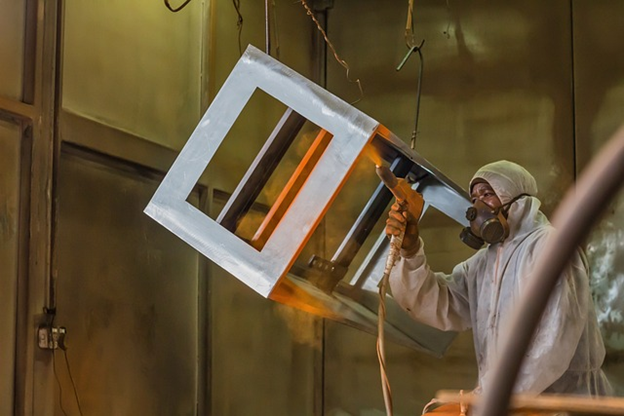In today’s rapidly advancing technological landscape, powder coatings have emerged as a pivotal component in numerous industries. They are not just a mere alternative to traditional liquid paints but have revolutionized the way we approach surface protection and aesthetics. Powder coating offers numerous benefits, including durability, environmental friendliness, and economic efficiency. This blog post will delve into various innovative applications of powder coatings in modern industries, showcasing their versatility and effectiveness.
What Are Powder Coatings?
Powder coatings are a type of coating that is applied as a free-flowing, dry powder. Unlike traditional liquid paint, which is delivered via an evaporating solvent, powder coating is typically applied electrostatically and then cured under heat to allow it to flow and form a “skin.” This type of coating is used to create a hard finish that is tougher than conventional paint.
Benefits of Powder Coatings
Durability and Longevity
Powder coatings provide a much thicker and more durable coating than conventional paints. This results in a surface that is highly resistant to chipping, scratching, fading, and wearing, which is crucial in high-traffic areas and harsh environmental conditions.
Environmental Impact
One of the most significant advantages of powder coatings is their minimal environmental impact. Unlike liquid paints, powder coatings contain no solvents and release negligible amounts of volatile organic compounds (VOCs) into the atmosphere, making them a much greener option.
Cost-Effectiveness
Despite the higher initial cost, powder coatings are cost-effective in the long run. The application process has a higher transfer efficiency, meaning less waste, and the durability of the finish reduces the need for frequent repaints and maintenance.
Industrial Applications of Powder Coatings
Automotive Industry
The automotive industry was one of the first to recognize the benefits of powder coatings. These coatings are used extensively for both aesthetic and functional purposes. They are applied to car bodies, wheels, and various engine parts to provide a durable and high-quality finish. The resistance to corrosion and ability to withstand high temperatures make them ideal for engine components.
Construction and Architecture
In construction and architecture, powder coatings are used on a variety of structures and components. From steel frameworks to aluminum windows and doors, these coatings offer excellent protection against the elements. They also allow for a wide range of colors and finishes, giving architects and builders the flexibility to achieve their desired aesthetic.
Consumer Goods
Powder coatings are found on many consumer goods, from bicycles and lawnmowers to kitchen appliances and furniture. The durability of the coating ensures that these products can withstand regular use without degrading in appearance or function. Additionally, the wide variety of available colors and finishes allows manufacturers to create visually appealing products.
Electrical and Electronics Industry
The electrical and electronics industry also benefits from powder coatings. These coatings are used to protect various components such as switchgear, lighting fixtures, and even certain types of electronic enclosures. The non-conductive properties of powder coatings make them an excellent choice for electrical insulation.
Healthcare and Medical Equipment
In the healthcare sector, powder coatings are used to coat various types of medical equipment, including hospital beds, wheelchairs, and surgical instruments. The coatings provide a durable, hygienic, and easy-to-clean surface, which is essential in medical environments.
Agriculture and Heavy Machinery
The agricultural industry relies on powder coatings for their heavy machinery and equipment. Tractors, plows, and other farm equipment are often exposed to harsh conditions, including extreme weather and rough handling. Powder coatings provide the necessary protection to ensure these machines remain operational and look good over time.
Renewable Energy Sector
With the growing emphasis on renewable energy, powder coatings are being increasingly used in the solar and wind power industries. Solar panel frames and wind turbine components are coated to withstand environmental exposure and ensure long-term performance and durability.
Technological Innovations in Powder Coatings
Nanotechnology
Nanotechnology is beginning to make a significant impact on powder coatings. By incorporating nanoparticles into the coatings, manufacturers can enhance the properties of the finish, such as increasing scratch resistance, improving adhesion, and providing better UV protection.
Low Temperature Curing
Traditionally, powder coatings required high temperatures to cure, which limited their use on heat-sensitive substrates. However, advancements in low-temperature curing powders have expanded the range of materials that can be coated, including plastics and composites.
Anti-Microbial Coatings
In response to the growing need for hygiene, particularly in healthcare settings, anti-microbial powder coatings have been developed. These coatings inhibit the growth of bacteria and other microbes on surfaces, contributing to a cleaner and safer environment.
Future Trends in Powder Coatings
Customization and Personalization
As consumers demand more personalized products, the ability to customize powder coatings is becoming increasingly important. Advances in technology allow for a wider variety of colors, textures, and finishes, enabling manufacturers to meet specific customer preferences.
Sustainability
The push towards sustainability is driving innovation in powder coatings. Research is focused on developing even more environmentally friendly coatings with reduced energy consumption during application and curing. Recyclability and the use of renewable resources in powder coating formulations are also areas of active investigation.
Smart Coatings
The concept of smart coatings is gaining traction, where the coating itself can respond to environmental changes. For example, coatings that change color with temperature or provide real-time data on structural integrity are being explored, opening up new possibilities for powder coatings in various applications.
Conclusion
Powder coatings have become an integral part of modern industry, offering a durable, cost-effective, and environmentally friendly alternative to traditional paints. Their applications span a wide range of industries, from automotive to healthcare, and ongoing technological advancements promise to further expand their utility and performance.




